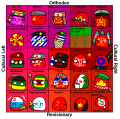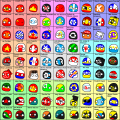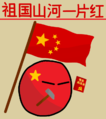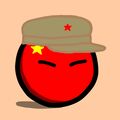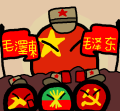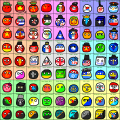Maoism or Mao Zedong Thought is a type of ![]() Marxism-Leninism associated with Mao Zedong, the chairman of the Communist Party of China. Maoism can be identified as
Marxism-Leninism associated with Mao Zedong, the chairman of the Communist Party of China. Maoism can be identified as ![]() economically far-left,
economically far-left, ![]() totalitarian, and
totalitarian, and ![]() culturally far-left It is important to note that
culturally far-left It is important to note that ![]() Maoism proper was formulated by
Maoism proper was formulated by ![]() Chairman Gonzalo and the
Chairman Gonzalo and the ![]() Peruvian Communist Party. During the times of Chairman Mao, his thought was known as Mao Zedong Thought.
Peruvian Communist Party. During the times of Chairman Mao, his thought was known as Mao Zedong Thought.
History
Formation
Maoism is a variant of ![]() Marxism-Leninism in China that was developed in the 1930s in the unrecognized state
Marxism-Leninism in China that was developed in the 1930s in the unrecognized state ![]() ‘China Soviet Republic’ as a major rebellion force against the
‘China Soviet Republic’ as a major rebellion force against the ![]() authoritarian nationalist government of Right KMT. At that time, Mao was known in the CPC for his focus on the rural ereas and objetion to the "orthodox" route of Lenninist revolution which emphasised wresting the control of cities . Instead, Mao believed in "rural ereas encircle the cities", and founded (at least played an important part in founding) the first rural revolutionary base in China- Jinggangshan Revolutionary Base.
authoritarian nationalist government of Right KMT. At that time, Mao was known in the CPC for his focus on the rural ereas and objetion to the "orthodox" route of Lenninist revolution which emphasised wresting the control of cities . Instead, Mao believed in "rural ereas encircle the cities", and founded (at least played an important part in founding) the first rural revolutionary base in China- Jinggangshan Revolutionary Base.
Mao continued having conflicts with the "Bolsheviks" represented by ![]() Wang Ming, who loyally followed Stalin’s doctrine of advocacy of rapid industrialization in China. Mao developed his idea of peasantry-worker unity as vanguards of the communist revolution in China’s specific case, and argued that a strong alliance with the peasantry is a necessity in China for the revolution to succeed. During the Long March, Mao's brilliant generalship formed a sharp contrast with the failure of Chinese Central Red Army under his opponents, which won him a sable military status. However, it was not until the mid-40s that he exactly dominated the party.
Wang Ming, who loyally followed Stalin’s doctrine of advocacy of rapid industrialization in China. Mao developed his idea of peasantry-worker unity as vanguards of the communist revolution in China’s specific case, and argued that a strong alliance with the peasantry is a necessity in China for the revolution to succeed. During the Long March, Mao's brilliant generalship formed a sharp contrast with the failure of Chinese Central Red Army under his opponents, which won him a sable military status. However, it was not until the mid-40s that he exactly dominated the party.
During the Japanese invasion of China, Mao advocated for a United Front with the Nationalist faction, however within limits. He beated Wang Ming (who emphasised the United Front above the party's independence) and Zhang Guotao (who was later considered betraying the CPC and turning to the ![]() KMT)[11]. After eight years of fighting together, the United Front proved victorious over Japanese aggression. The most notable battle of that the communists fought in the war was the Hundred Regiment Offensive. The seventh national congress of the CCP in 1945 identified "Mao Zedong Thoughts" as the guiding ideology of the party, along with Marxism-Lennism.
KMT)[11]. After eight years of fighting together, the United Front proved victorious over Japanese aggression. The most notable battle of that the communists fought in the war was the Hundred Regiment Offensive. The seventh national congress of the CCP in 1945 identified "Mao Zedong Thoughts" as the guiding ideology of the party, along with Marxism-Lennism.
Development
Immediately after the end of the Sino-Japanese War, the communists started seizing land and attacking the nationalist force[12]. The army size was expanded to 1.2 million (With 2.6 million militias) versus 2 million nationalist troops (With 2.3 million militias) with the supplies of Soviet weapons from the equipment Stalin seized in Manchuria. Due to Chiang’s poor military skills, the massive collapse or morales of the nationalist soldiers after eight years of war with Japan, hyperinflation in the nationalist-controlled regions, and the American interference in the Marshall Mission, Mao and the communists were able to seize the Mainland in 4 years time after major battles that defeated the incompetent and corrupt military of the nationalists and Chiang’s extremely unpopular government.
After the Communist force won the civil war, Mao declared that China entered a stage which was called the “New Democratic Revolution” by the newly established Chinese government. The CPC formed an alliance called the 'United Front' with parties such as ![]() the RCCK. Political dissents, Republic of China/KMT sympathizers, and landlords were purged in the subsequent political cleansings such as
the RCCK. Political dissents, Republic of China/KMT sympathizers, and landlords were purged in the subsequent political cleansings such as ![]() Campaign to Suppress Counterrevolutionaries and the
Campaign to Suppress Counterrevolutionaries and the ![]() Anti-Rightist Campaign. However, just as socialist construction began the Soviet Union would renounce
Anti-Rightist Campaign. However, just as socialist construction began the Soviet Union would renounce ![]() Joseph Stalin’s theory of Marxism-Leninism and allied Eastern European states that had developed exactly in line with it began to one by one fall to this new ideology. China, however, refused to follow
Joseph Stalin’s theory of Marxism-Leninism and allied Eastern European states that had developed exactly in line with it began to one by one fall to this new ideology. China, however, refused to follow ![]() Khrushchev’s path and denounced him as a revisionist pseudo-socialist eventually, even though the PRC supported Khrushchev’s invasion of Hungary and pressed for it. Therefore, the Sino-Soviet Split split happened with Soviet projects scrapped, economic aid cut off, and scientists left China, which was detrimental to China’s economic development. At this point began a debate amongst the CCP arose over whether they had progressed the relations of production far enough in order to solely focus on economic development. Mao opposed this line, and instead believed that economic development could be obtained without sacrificing development in the relations of production. Agricultural policies such as collective farming and mass production were implemented, which was known as the ‘Great Leap Forward’ that failed to achieve its main objectives due to a complex variety of reasons and led to the Great Chinese Famine.
Khrushchev’s path and denounced him as a revisionist pseudo-socialist eventually, even though the PRC supported Khrushchev’s invasion of Hungary and pressed for it. Therefore, the Sino-Soviet Split split happened with Soviet projects scrapped, economic aid cut off, and scientists left China, which was detrimental to China’s economic development. At this point began a debate amongst the CCP arose over whether they had progressed the relations of production far enough in order to solely focus on economic development. Mao opposed this line, and instead believed that economic development could be obtained without sacrificing development in the relations of production. Agricultural policies such as collective farming and mass production were implemented, which was known as the ‘Great Leap Forward’ that failed to achieve its main objectives due to a complex variety of reasons and led to the Great Chinese Famine.
After the Sino-Soviet Split, the party began to formulate the idea that China develops an independent course of their economy. Mao wanted to utilize the resources they had gathered in the abundance of labor and popular enthusiasm. Water conservancy and irrigation eventually led to sustained growth in agricultural production. Flood defense was developed along with the practice of Terracing. The slogan “walking on two legs” was used to describe the pattern of industrial development. The development of small to medium size industry alongside the development of the emphasis on heavy industry. Compared to the more rigid and centralized economic system which had prevailed in the USSR, this period saw a different course of events with China adopting its unique form of the command economy. The rural industry established made use of labor-intensive strategies as opposed to plans entirely dependent on capital. As they served more local interests they did not require the development of nationwide infrastructure to prevail. Life expectancy (partially due to Mao’s pro-natalist policy) rose from 36 years in to 62 years and the literacy rate in China tripled to a record 60% from 20% in 1949 as the government introduced universal healthcare and education. Not only were smaller rural industries somewhat improved, but the heavy industry was accelerated as well with one example being the Teaching oil field. China also developed its own nuclear weapons with the help of engineers such as Qian Xuesen, becoming the fifth nuclear power on earth. Additionally, during the Mao era, the female labor participation rate was over 70%. After Mao died, it continued to decline. Despite these achievements, 88.1% of Chinese were still living in absolute poverty in 1980, with one of the lowest GDP per capita on earth.
However, Mao feared a threat looming over the country as he believed if capitalism could be restored in the Soviet Union, why couldn't it be restored in the People’s Republic of China? To many, it seemed a far-off and distant threat. However many people (such as Mao Zedong himself and the ![]() Gang of Four) believe they saw the beginning of the capitalist road among official party members. Mao believe that the reactionary ideology ran deep within China, as a result of years of hosting such relations of production. Land Reform annihilated the landlord class, but the conservative ideology was still prevalent in China, especially in rural regions. Mao feared that China was not travelling down the socialist path, and rather was on track to regress to capitalism. The
Gang of Four) believe they saw the beginning of the capitalist road among official party members. Mao believe that the reactionary ideology ran deep within China, as a result of years of hosting such relations of production. Land Reform annihilated the landlord class, but the conservative ideology was still prevalent in China, especially in rural regions. Mao feared that China was not travelling down the socialist path, and rather was on track to regress to capitalism. The ![]() Cultural Revolution happened in this context and the theory driving the event is simple: “The class struggle continues, and is even intensified under socialism”. The Cultural Revolution oversaw the destruction of many Chinese traditional cultural architectures and the prosecution of many intellectuals and teachers, and economic activities were halted in many regions. Many members that belonged to the so-called Five Black Categories and their family were also prosecuted in this era.
Cultural Revolution happened in this context and the theory driving the event is simple: “The class struggle continues, and is even intensified under socialism”. The Cultural Revolution oversaw the destruction of many Chinese traditional cultural architectures and the prosecution of many intellectuals and teachers, and economic activities were halted in many regions. Many members that belonged to the so-called Five Black Categories and their family were also prosecuted in this era.
In the 1970s, as the relationship between China and the ![]() USSR further soured with the Chinese government isolated internationally, China began to look up to its old capitalist rivals. The USA also abandoned its hardline anti-communist doctrine in favor of pragmatism and realpolitik under
USSR further soured with the Chinese government isolated internationally, China began to look up to its old capitalist rivals. The USA also abandoned its hardline anti-communist doctrine in favor of pragmatism and realpolitik under ![]() Richard Nixon and
Richard Nixon and ![]() Henry Kissinger to deter the common enemy - the USSR. Therefore, the Ping-pong diplomacy initiative under
Henry Kissinger to deter the common enemy - the USSR. Therefore, the Ping-pong diplomacy initiative under ![]() Zhou Enlai eventually led to an improvement of the US-China relationship and the Sino-American rapprochement. A gradual establishment of diplomatic relationships happened between China and
Zhou Enlai eventually led to an improvement of the US-China relationship and the Sino-American rapprochement. A gradual establishment of diplomatic relationships happened between China and ![]() western, NATO-aligned countries, and eventually, the United States in 1979, with these countries renouncing their recognization of
western, NATO-aligned countries, and eventually, the United States in 1979, with these countries renouncing their recognization of ![]() Taiwan under the Kuomintang. The implications of the events were enormous as China since then, despite being a communist country, had a much better relationship with the West and NATO than with the USSR and the Eastern Socialist Camp.
Taiwan under the Kuomintang. The implications of the events were enormous as China since then, despite being a communist country, had a much better relationship with the West and NATO than with the USSR and the Eastern Socialist Camp.
 Hua Guofeng and the Two Whatevers
Hua Guofeng and the Two Whatevers
The new government of ![]() Hua Guofeng arrested the Gang of Four and imprisoned them for life and ended the Cultural Revolution. Hua emphasized economic development over popular movements, and proposed the “Two Whatevers”, reaffirming his loyalty to the principles of Mao Zedong Thought. Hua also visited
Hua Guofeng arrested the Gang of Four and imprisoned them for life and ended the Cultural Revolution. Hua emphasized economic development over popular movements, and proposed the “Two Whatevers”, reaffirming his loyalty to the principles of Mao Zedong Thought. Hua also visited ![]() Yugoslavia and
Yugoslavia and ![]() Romania and improved the relationship between the PRC government with these countries, as well as tried to learn the modern industrial experiences from them. The relationship between China and western countries such as
Romania and improved the relationship between the PRC government with these countries, as well as tried to learn the modern industrial experiences from them. The relationship between China and western countries such as ![]() FRG,
FRG, ![]() Japan, and the
Japan, and the ![]() U.S. improved as China took many loans from these countries. Hua subsequently launched the West Leap Forward project, which brought many technologies and allowed more foreign investment without changing the nature of the command economy with ambitious but often unobtainable economic targets. The West Leap Forward failed and led to criticisms within the party and the weakening of Hua’s position, allowing
U.S. improved as China took many loans from these countries. Hua subsequently launched the West Leap Forward project, which brought many technologies and allowed more foreign investment without changing the nature of the command economy with ambitious but often unobtainable economic targets. The West Leap Forward failed and led to criticisms within the party and the weakening of Hua’s position, allowing ![]() Deng and his allies to attack Hua for “dogmatism,” which eventually toppled his leadership.
Deng and his allies to attack Hua for “dogmatism,” which eventually toppled his leadership.
One of the reasons that Hua’s regime faltered quickly can be attributed to his lack of power legitimacy as Hua was not from the Red Army and PLA background and made no contributions to the CCP’s revolution. Hua also promoted Deng and other Mao era dissidents like Ye Jianying and ![]() Hu Yaobang, who wanted broad reforms of Mao’s ideals and his
Hu Yaobang, who wanted broad reforms of Mao’s ideals and his ![]() command economy rather than just the end of the cultural revolution his leadership wanted. Hua’s regime also introduced small liberations of party control and more pluralism, which allowed Deng’s allies to emerge and seize power from his “Little Gang of Four” clique.
command economy rather than just the end of the cultural revolution his leadership wanted. Hua’s regime also introduced small liberations of party control and more pluralism, which allowed Deng’s allies to emerge and seize power from his “Little Gang of Four” clique.
Modern Day
In Modern China, the rising social and economic inequality as well as the return of the capitalist class with red paint and exploitation of workers has caused a wave of resurgence of Maoist support such as the banned ![]() Maoist Communist Party of China. However, none of these movements are formidable and are usually crushed by the
Maoist Communist Party of China. However, none of these movements are formidable and are usually crushed by the ![]() Modern CCP with an iron fist.
Modern CCP with an iron fist.
Additions to  Marxism-Leninism
Marxism-Leninism
Maoism can be seen as both a continuation and split from classical ![]() Marxism-Leninism. Mao, throughout his Marxist revolution in China, formulated 5 new primary additions to
Marxism-Leninism. Mao, throughout his Marxist revolution in China, formulated 5 new primary additions to ![]() Marxism-Leninism, being the Mass Line, Protracted People's War, New Democracy, the theory of Cultural Revolution and the theory of the Three Delineated Worlds.
Marxism-Leninism, being the Mass Line, Protracted People's War, New Democracy, the theory of Cultural Revolution and the theory of the Three Delineated Worlds.
Mass Line
The Mass Line is a theory that states that the Masses of Peasants and Workers must be in unison ideologically with the Communist Party. Therefore, Communist Party members must go unto the masses and consult their needs and gather information, which will be further relayed to the party. The party then interprets this information within a Socialist framework and applies this in a cultural or economic change.
Protracted People's War
Protracted People’s War, often abbreviated as PPW is what Maoists view as the proletarian’s military strategy. Protracted People’s War combines insurgency with guerrilla warfare, offensives by the People’s Army, concentrated under the leadership of the Communist party, It is a misunderstanding to believe that this form war is simply a peasant strategy used in semi-feudal and semi-colonial backwaters. The People’s War uses three revolutionary instruments. The United Front, the People’s Army, and the Party itself. The United Front allows for agitation in areas where the party has yet to establish base areas. The People’s Army is the method of keeping politics in command of the gun, the Party having an armed wing. The “Party” is self-explanatory. Protracted People’s War also emphasizes the protracted nature of revolutions, hence the name.
New Democracy
![]() The New Democratic society is a transitional form between the New Democratic Revolution and the
The New Democratic society is a transitional form between the New Democratic Revolution and the ![]() Socialist Revolution. Different from the Socialist Society, the New Democracy's Fundamental task is not to overthrow
Socialist Revolution. Different from the Socialist Society, the New Democracy's Fundamental task is not to overthrow ![]() Capitalist Society, but overthrow
Capitalist Society, but overthrow ![]() Imperialist Society and
Imperialist Society and ![]() Feudalist Society. It's also different from Capitalist Society because its leadership is the proletariat. Its goal is "establish a Democratic Republic under the joint dictatorship of all anti-imperialist and anti-feudal people under the leadership of the proletariat."
Feudalist Society. It's also different from Capitalist Society because its leadership is the proletariat. Its goal is "establish a Democratic Republic under the joint dictatorship of all anti-imperialist and anti-feudal people under the leadership of the proletariat."
Cultural Revolution
The theory of Cultural Revolution, originating in the People’s Republic of China shortly after the breaking of relations with the Soviet Union is one which states that the conclusion of the initial proletariat revolution and the dawn of proletariat dictatorship does not wipe out bourgeois ideology. On the contrary, it asserts that the class struggle is intensified during socialist transition and a near-continuous struggle against such ideology and its social roots. The target of cultural revolution is often aspects of the superstructure, often encompassing various existing markers of a capitalist or even a dynasty past.
Three Delineated Worlds
In the early 1970s, Mao Zedong put forward a thesis which analyzed the contradictions between imperialist powers and the semi-colonies of the world. He theorized that the first world, (in his case the US and the USSR) are imperial powers which compete for hegemony and fight over the division of the globe. The second world involves the imperial periphery (in his case Britain, Japan, France and others). The third world involves the colonies and semi-colonies of the world (in his case most of Africa and Asia). Many successive figures have put forward their strategies for handling the contradictions between the worlds, the most prominent of those being Deng Xiaoping.
Personality
Maoists often appear as a Chinese high school or college students who are usually very active to tweet about praising workers and instilling MLM's works to others. They often deplore at capitalist and revisionist and they may usually carrying a MLM's book with a badge "serve the people" on his chest.
How to Draw
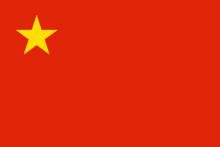
The design for Maoism is based on early designs of the flag of the People's Republic of China that lacked the 4 smaller stars.
- Draw a ball.
- Fill it with red.
- Draw a yellow star on the top left.
- Add the Asian eyes and you're done!
| Color Name | HEX | RGB | |
|---|---|---|---|
| Red | #DF2408 | 223, 36, 8 | |
| Yellow | #FFDF00 | 255, 223, 0 | |
Relations
同志们 (Comrades)
 毛泽东-第三世界主义 - We must liberate those who face the most exploitation!
毛泽东-第三世界主义 - We must liberate those who face the most exploitation! 切格瓦拉思想 - My fellow friend from Argentina.
切格瓦拉思想 - My fellow friend from Argentina. 马克思女权主义 - Women hold up half of the sky!
马克思女权主义 - Women hold up half of the sky! 黑人民族主义 - I like the Black Panthers for taking in my work and applying it to the oppressed African-American communities in America!
黑人民族主义 - I like the Black Panthers for taking in my work and applying it to the oppressed African-American communities in America! 马克思-列宁-毛泽东主义 - My modern day counterpart.
马克思-列宁-毛泽东主义 - My modern day counterpart. 工业主义 - The Great Leap Forward made China a major world power!!!
工业主义 - The Great Leap Forward made China a major world power!!! 左翼三民主义
左翼三民主义  - RCCK are very based and good
- RCCK are very based and good pawnsallies. We both respect Sun Yat-sen. 国家无神论 - Religion is just a bourgeoisie tool used to poison the working class!
国家无神论 - Religion is just a bourgeoisie tool used to poison the working class! 革命进步主义 - BURN DOWN THE OLD WORLD, THOSE WHO GET IN THE WAY AND CREATE A NEW!! REVOLT IS RATIONAL AND REVOLUTION IS RIGHTEOUS!!! (破旧立新,放眼世界;革命无罪,造反有理!)
革命进步主义 - BURN DOWN THE OLD WORLD, THOSE WHO GET IN THE WAY AND CREATE A NEW!! REVOLT IS RATIONAL AND REVOLUTION IS RIGHTEOUS!!! (破旧立新,放眼世界;革命无罪,造反有理!) Big Floppa - Caracals are known to catch birds out of the sky when jumping; too bad we didn't have those!
Big Floppa - Caracals are known to catch birds out of the sky when jumping; too bad we didn't have those!
统一战线 (United Front)
 斯大林主义 - You are 70% good and 30% bad. On the one hand, you were a successful revolutionary and a great influence to me and assisted me in the civil war. However the way you collectivized agriculture was idiotic ̶e̶v̶e̶n̶ ̶t̶h̶o̶u̶g̶h̶ ̶m̶y̶ ̶w̶a̶y̶ ̶k̶i̶l̶l̶e̶d̶ ̶m̶o̶r̶e̶ ̶p̶e̶o̶p̶l̶e̶. Also, stop disregarding peasants; but it’s a great shame that the revisionist scum Khrushchev just had to destroy all of your good legacies.
斯大林主义 - You are 70% good and 30% bad. On the one hand, you were a successful revolutionary and a great influence to me and assisted me in the civil war. However the way you collectivized agriculture was idiotic ̶e̶v̶e̶n̶ ̶t̶h̶o̶u̶g̶h̶ ̶m̶y̶ ̶w̶a̶y̶ ̶k̶i̶l̶l̶e̶d̶ ̶m̶o̶r̶e̶ ̶p̶e̶o̶p̶l̶e̶. Also, stop disregarding peasants; but it’s a great shame that the revisionist scum Khrushchev just had to destroy all of your good legacies. 乔治主义 - Capitalist scums, but they also see landlords as parasites, which is based.
乔治主义 - Capitalist scums, but they also see landlords as parasites, which is based. 自发毛派 - Oh yes, I remember the time when I was an anarchist... dark times...
自发毛派 - Oh yes, I remember the time when I was an anarchist... dark times... 波尔布特主义 - Inspired by me but traditionalist and HOLY SH*T STOP KILLING CHINESE PEOPLE! Also, killing too much ordinary people will make them be afraid of socialism. That being said, I still funded you against Vietnam and the Soviet imperialists.
波尔布特主义 - Inspired by me but traditionalist and HOLY SH*T STOP KILLING CHINESE PEOPLE! Also, killing too much ordinary people will make them be afraid of socialism. That being said, I still funded you against Vietnam and the Soviet imperialists. 尼克松主义 - Cultural Revolution and 4 pests campaign go BRR, but you are still a good friend.
尼克松主义 - Cultural Revolution and 4 pests campaign go BRR, but you are still a good friend. 新保守主义 - Thanks for helping me defeat the Japanese imperialists during WWII and turning your back on Chiang Kai-shek. But we had our disputes during the Cold War, especially regarding Tibet. Eventually, Zhou Enlai reached out to Kissinger to set up our iconic meeting with Nixon so we could team up against the Soviets.
新保守主义 - Thanks for helping me defeat the Japanese imperialists during WWII and turning your back on Chiang Kai-shek. But we had our disputes during the Cold War, especially regarding Tibet. Eventually, Zhou Enlai reached out to Kissinger to set up our iconic meeting with Nixon so we could team up against the Soviets. 胡志明思想 - Sorry for betraying you earlier, comrade, but why did you support
胡志明思想 - Sorry for betraying you earlier, comrade, but why did you support  him? Also, damn you Le Duan for purging pro-Chinese CPV members and committing genocide against Chinese minorities in Vietnam following the Sino-Soviet split!!!!
him? Also, damn you Le Duan for purging pro-Chinese CPV members and committing genocide against Chinese minorities in Vietnam following the Sino-Soviet split!!!! 霍查主义 - Fellow anti-revisionist Marxist even though you hate me for hanging out with Nixon.
霍查主义 - Fellow anti-revisionist Marxist even though you hate me for hanging out with Nixon. 主体思想 - I help you fight against imperialist
主体思想 - I help you fight against imperialist  RoK, but stop being so revisionist!
RoK, but stop being so revisionist! 无政府共产主义 - Kropotkin helped radicalize me, but anarchism is childish.
无政府共产主义 - Kropotkin helped radicalize me, but anarchism is childish. 庇隆主义 - My friend from Latin America, but why are you an anti-communist succauth?
庇隆主义 - My friend from Latin America, but why are you an anti-communist succauth? 民族共产主义 - "Chinese Communists must therefore combine patriotism with internationalism."
民族共产主义 - "Chinese Communists must therefore combine patriotism with internationalism." 孙中山思想 - He is a progressive bourgeois nationalist revolutionary who represents the Old Democracy stage of the Chinese revolution. He greatly inspired me even though he was against Marxism. He is a great forgoer of the Chinese Revolution and we will build on his legacy to further the revolution to next stage.
孙中山思想 - He is a progressive bourgeois nationalist revolutionary who represents the Old Democracy stage of the Chinese revolution. He greatly inspired me even though he was against Marxism. He is a great forgoer of the Chinese Revolution and we will build on his legacy to further the revolution to next stage.
走资派 (Capitalist Roaders)
 右翼三民主义 - Lol, get rekt reactionary chauvinists!
右翼三民主义 - Lol, get rekt reactionary chauvinists! We have a mutual love for Sun-Yat Sen. 赫鲁晓夫主义
赫鲁晓夫主义(玉米晓夫)- F*ck you, Khrushchev! Social imperialist and revisionist scum who turned the USSR into a pseudo-socialist imperialist state. 勃列日涅夫主义
勃列日涅夫主义(苏勋宗)- You too! You are just a Khrushchevist without Khrushchev!
Khrushchevist without Khrushchev! 保守社会主义 - I don't care if you're on my side or don't like gays. Prepare to get Cultural Revolutionized!
保守社会主义 - I don't care if you're on my side or don't like gays. Prepare to get Cultural Revolutionized! 反动社会主义 - Same as above.
反动社会主义 - Same as above. 邓小平理论/中国特色社会主义 - Revisionist scum who killed my ideals. Never forget how you purged my supporters and crushed genuine Marxists during the Tiananmen Square Incident! Not to add how you enable crony capitalism from the 1990s onwards. Damn it, Deng.
邓小平理论/中国特色社会主义 - Revisionist scum who killed my ideals. Never forget how you purged my supporters and crushed genuine Marxists during the Tiananmen Square Incident! Not to add how you enable crony capitalism from the 1990s onwards. Damn it, Deng. 胡耀邦思想 - As much as I hate Deng, I must admit that he was too soft on Zhao Ziyang.
胡耀邦思想 - As much as I hate Deng, I must admit that he was too soft on Zhao Ziyang. 李鹏思想 - Just because you oppose free-market capitalism doesn’t make you the good guy.
李鹏思想 - Just because you oppose free-market capitalism doesn’t make you the good guy. 三个代表/江泽民思想
三个代表/江泽民思想  - Out of all modern Chinese politicians, you represent a whole new level of low. Enabled the rise of reactionary billionaires such as Jack Ma and Guo Wengui. Support massive exploitation by international corporations (e.g. Foxconn, Apple, McDonalds, etc.). Dismantled the welfare state. Privatized education and healthcare. Persecuted my modern followers for wanting better living standards. The list goes on and on. The only good things you did was expanding the laojiao system and your persecution of Falun Gong and Eastern Lightning. Even if most of my modern supporters are disorganized and lazy.
- Out of all modern Chinese politicians, you represent a whole new level of low. Enabled the rise of reactionary billionaires such as Jack Ma and Guo Wengui. Support massive exploitation by international corporations (e.g. Foxconn, Apple, McDonalds, etc.). Dismantled the welfare state. Privatized education and healthcare. Persecuted my modern followers for wanting better living standards. The list goes on and on. The only good things you did was expanding the laojiao system and your persecution of Falun Gong and Eastern Lightning. Even if most of my modern supporters are disorganized and lazy.
 科学发展观-李克强思想
科学发展观-李克强思想  - Yes, I denounced and tortured Hu Jintao's father for "capitalist transgressions". What you gonna do about it? Not much better than Deng or Jiang, otherwise. Wen Jiabao is especially cringe due to his sympathy for western liberal democracy.
- Yes, I denounced and tortured Hu Jintao's father for "capitalist transgressions". What you gonna do about it? Not much better than Deng or Jiang, otherwise. Wen Jiabao is especially cringe due to his sympathy for western liberal democracy. 习近平新时代中国特色社会主义
习近平新时代中国特色社会主义新时代中国特色社会主义新时代中国特色社会主义主义主义主义主义思想 - The western bourgeois media like to think you're the next me for some reason yet you’re still a filthy c*pitalist who simp for Bill Gates, Elon Musk and Jeff Bezos. Slightly better than your predecessors, but that ain't saying much. Good job defeating Jiang and his oligarchs though. Some even call you a "chinazi", so take off that mask, IMPERIALIST! (Chen Quanguo and Pinkie fangirls should do the same). 马云思想 - Why do you even exist? I wish the western media reports about your so-called ”disappearance” were true you corporate fraudster.
马云思想 - Why do you even exist? I wish the western media reports about your so-called ”disappearance” were true you corporate fraudster. 种族主义 - Racist garbage will be exterminated!!!
种族主义 - Racist garbage will be exterminated!!! 陈独秀思想 - Chen Duxiu is a revisionary Trotskyist idiot.
陈独秀思想 - Chen Duxiu is a revisionary Trotskyist idiot. 日本帝国主义 - Imperialist scum.
日本帝国主义 - Imperialist scum. 自由主义 - We must combat him! Cast away Illusions and prepare for struggle!
自由主义 - We must combat him! Cast away Illusions and prepare for struggle! 资本主义 - F*ck you, bourgeois scum!
资本主义 - F*ck you, bourgeois scum! 帝国主义 - You are the root of all evils along with the above.
帝国主义 - You are the root of all evils along with the above. But Tibet is rightful Chinese clay. 反动主义 - The Great Proletarian Cultural Revolution will forever wipe you out of China!
反动主义 - The Great Proletarian Cultural Revolution will forever wipe you out of China! I guess? 封建专制、
封建专制、 父权制、
父权制、 中国民间信仰、
中国民间信仰、 大男子主义- "These four authorities--political, clan, religious and masculine--are the embodiment of the whole feudal-patriarchal system and ideology, and are the four thick ropes binding the Chinese people, particularly the peasants."[13]
大男子主义- "These four authorities--political, clan, religious and masculine--are the embodiment of the whole feudal-patriarchal system and ideology, and are the four thick ropes binding the Chinese people, particularly the peasants."[13] 泰式法西斯主义 - I may have had a hand in the Communist insurgency in Thailand.
泰式法西斯主义 - I may have had a hand in the Communist insurgency in Thailand. 铁托主义 - Tito has courage in thinking, speaking, and doing, but his foundation is imperialism and capitalism, not Marxism-Leninism. Our foundation is Marxism-Leninism; therefore, we are correct, and we will not get into trouble when we think, speak, and do with courage.
铁托主义 - Tito has courage in thinking, speaking, and doing, but his foundation is imperialism and capitalism, not Marxism-Leninism. Our foundation is Marxism-Leninism; therefore, we are correct, and we will not get into trouble when we think, speak, and do with courage. At least Hua Guofeng still likes him. 佛教神权统治 &
佛教神权统治 &  佛教无政府主义 - f*ck religion. And f*ck "Tibet". I may be "anti-imperialist" but my conquest against filthy Tibetan reactionaries was absolutely justified and I have no regrets.
佛教无政府主义 - f*ck religion. And f*ck "Tibet". I may be "anti-imperialist" but my conquest against filthy Tibetan reactionaries was absolutely justified and I have no regrets. 佛教社会主义 - Sorry, your fake "socialism" won't convince me. Your religious cringe is worthy enough for you to be
佛教社会主义 - Sorry, your fake "socialism" won't convince me. Your religious cringe is worthy enough for you to be invadedforcefully liberated. Oh, and the Dalai Lama isn't a Marxist, I don't care if he says he is. 儒家思想 - Down with the so-called intellectuals! (打倒臭老九!路线错误,知识越多越反动!)
儒家思想 - Down with the so-called intellectuals! (打倒臭老九!路线错误,知识越多越反动!)(请忽略毛本人在早年以及他快死的时候对孔子的看法 Please ignore what Mao himself thought of Confucius in his early years and when he was dying))[14]- 一切
 伊斯兰教相关意识形态 All the Islamic ideologies - Potential Soviet supporters who had been ruled by a Soviet warlord for ten long years! Prepared to be annexed!
伊斯兰教相关意识形态 All the Islamic ideologies - Potential Soviet supporters who had been ruled by a Soviet warlord for ten long years! Prepared to be annexed! - File:Nagy3.png 纳吉主义 - Counterrevolutionary chauvinist imperialist puppet. No matter how much I hate Khrushchev, he was right to get rid of you.
 小粉红主义 - Stop pretending to uphold my thought while read no books of mine,you filthy blueshirtist, the Internet maoids may not be perfect but I hope them can lecture you some true Marxism-Leninism.
小粉红主义 - Stop pretending to uphold my thought while read no books of mine,you filthy blueshirtist, the Internet maoids may not be perfect but I hope them can lecture you some true Marxism-Leninism. But I think you won’t listen to anyone, kids. 尼赫鲁思想 - I once thought national bourgeoisie in the third world could become our good alliance to combat imperialists. How wrong I was!! Get off from legitimate Chinese territories you pseudo-socialist scum!
尼赫鲁思想 - I once thought national bourgeoisie in the third world could become our good alliance to combat imperialists. How wrong I was!! Get off from legitimate Chinese territories you pseudo-socialist scum! 发达社会主义理论 - Social imperialist Brezhnevite Soviet puppets and revisionists.
发达社会主义理论 - Social imperialist Brezhnevite Soviet puppets and revisionists.
Further Information
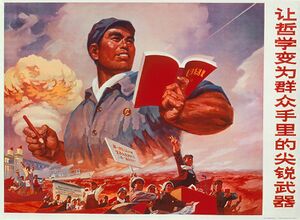
Wikipedia
- Maoism
- Mao Zedong
- Maoist China

- Chinese Soviet Republic

- Soviet Zone
- Red Guards
- Sino-Soviet Split
- Gang of Four
- Chinese Communist Revolution
- Great Leap Forward
- Cultural Revolution
- New Democracy
- Antagonistic Contradiction
- People's War
- Mass Line
- Three Worlds Theory
- Self-Criticism
 Five Principles of Coexistence
Five Principles of Coexistence
Literature
- Quotations from Chairman Mao Tse-tung (Mao's Little Red Book)
- Selected Works of Mao Tse-Tung
- On Guerilla Warfare
- On Contradiction
- On Practice
- On New Democracy
- On The Correct Handling of Contradictions Among The People
- Oppose Book Worship
- Combat Liberalism
Online Communities
Gallery
-
Credit: u/duy_physics, Source
-
Credit: u/PixelLumi Source
-
Credit:
 TheLegend2T, Source
TheLegend2T, Source
-
Credit:
 TheLegend2T, Source
TheLegend2T, Source
-
-
Original Image
-
-
-
-
-
Old Drawing for Maoism
-
References
- ↑ http://www.ccfd.org.tw/ccef001/index.php?searchword=%E5%8F%8D%E5%8B%95&searchphrase=all&Itemid=167&option=com_search&limitstart=0
- ↑ They mainly despise Jiang Zemin, Hu Jintao, and Wen Jiabao for "selling out to the West" but are more positive about Bo Xilai and Xi Jinping
- ↑ While Bo Xilai was idolized by Chinese leftists when he was Communist Party Secretary of Chongqing he is largely forgotten and rarely talked about since Xi became paramount leader due to censorship. Many just think of him as another corrupt official who lost a power struggle.
- ↑ The Chinese Communist Party did not consider the New Democracy as a fully socialist society
- ↑ Hua strongly opposed the radicalism of the Gang of Four and he ended the cultural revolution.
- ↑ https://us3.campaign-archive.com/?u=dbba24051877a5ba49ca529f2&id=068c0ff5d5&e=2dde1b6cba
- ↑ He was borned in China and lives and works in China now.
- ↑ Referring the so-called ‘Campaign to Suppress Counter-Revolutionaries’ and 'Anti-Rightist Campaign'.
- ↑ Forced labor and political rehabilitation
- ↑ [1]
- ↑ Even under the United Front, the CPC and the KMT were in a quasi hostile state.
- ↑ According to the communists themselves, it was Chiang Kai-shek who started the first attact.
- ↑ 《湖南农民运动考察报告》 Report on an Investigation of the Peasant Movement in Hunan, Selected Works, Volume I
- ↑ Mao himself had a good opinion of Confucius before he became China's leader, and considered Confucius a great man in the last years of his life.
| | |


